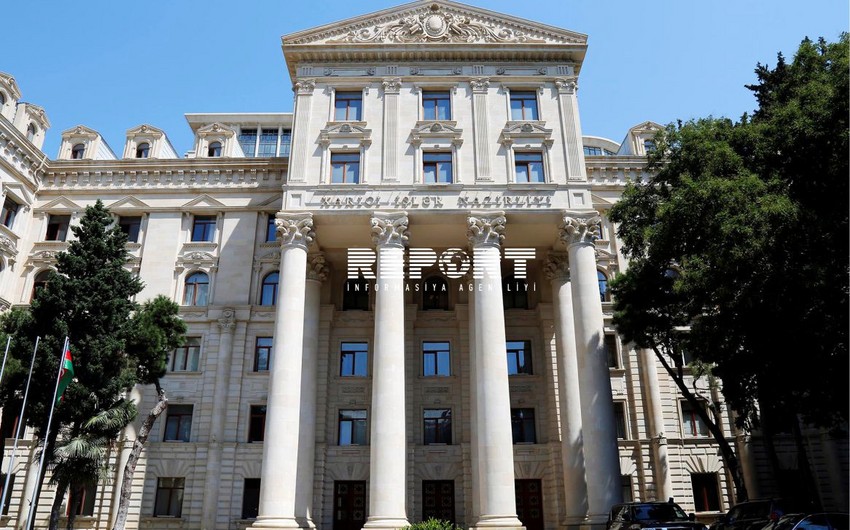The Ministry of Foreign Affairs has issued a statement on the 28th anniversary of the occupation of the Lachin district of the Republic of Azerbaijan by armed forces of Armenia. Report informs citing the Ministry.
As a result of the occupation of the Lachin district, which was not part of the former Nagorno-Karabakh Autonomous Oblast of Azerbaijan, 237 people killed, and 67 people went missing. Inhabitants of the region were subjected to ethnic cleansing, and currently, 77.700 Lachin residents live as internally displaced persons (IDP) in the different areas of Azerbaijan.
The occupation of Lachin, as a continuation of the aggression policy of the Republic of Armenia against Azerbaijan, has also inflicted severe damage to the state and private property of the district. Thus, 217 cultural, 101 educational, 142 healthcare, 462 commercial enterprises, and 30 communications, two transport, and various other production facilities were destroyed. Historical monuments of national and world significance vandalized: the sixth-century Albanian Aghoghlan cloister and the fourteenth century Malik Ajdar tomb, the mosque in Garigishlag village, and the ancient cemetery in Zabukh village were destroyed. The Lachin Museum of History and its unique collection of antique gold, silver, and bronze artifacts were plundered.
Like in the other occupied territories of Azerbaijan, the aggressor country Armenia continues its illegal activities in Lachin district as well, grossly violating international humanitarian law and its commitments under the Geneva Conventions. Geographic names of the region are changed, natural resources exploited, illegal infrastructural changes are carried out, and deliberate resettlement policy to alter the region's demographic situation is implemented.
As known, a decision has been adopted in favor of the Azerbaijani nationals who were forcibly displaced from the occupied Lachin district of Azerbaijan on June 16, 2015, on the case of "Chiragov and others v. Armenia" of European Court of Human Rights.
Armenia ignores the UN Security Council resolutions 822, 853, 874 and 884 adopted in 1993, which reaffirm the sovereignty and territorial integrity of Azerbaijan and Nagorno-Karabakh as part of Azerbaijan and demand immediate and unconditional withdrawal of the occupying forces from all the occupied territories of Azerbaijan. Armenia turns a blind eye to numerous decisions and resolutions of other international organizations and, under cover of peaceful settlement of the conflict, tries to strengthen the dangerous status quo regime based on the occupation of Nagorno-Karabakh and adjacent districts of Azerbaijan. It pursues the policy of annexation of the occupied territories of Azerbaijan.
However, there is an unchanging truth that the territorial integrity and sovereignty of Azerbaijan within its internationally recognized borders, including its Nagorno-Karabakh region and other adjacent districts, are recognized. Moreover, the international community unequivocally rejects the consequences of the occupation of the Azerbaijani territories. The military occupation of the Azerbaijani territories will never yield the political results pursued by Armenia. The territorial integrity of Azerbaijan within its internationally recognized borders has not been and cannot be a subject of negotiations.
The ultimate aim of the negotiations on the settlement of the Nagorno-Karabakh conflict is to eliminate the conflict's consequences, thus ending the occupation of the Azerbaijani territories and restoring the fundamental rights of the internally displaced persons. The norms and principles of international law, as enshrined in the UN Charter, the Helsinki Final Act, and the Paris Charter, constitute the basis of the negotiation process for the conflict's settlement. Armenia's speculative attempt to delay the negotiation process and the political settlement of the conflict through falsehood and deception are unacceptable and pose a significant obstacle to peace.
Eliminating the grave consequences of the conflict, along with being the commitment of the international community, is an unconditional right of Azerbaijan under the Charter of the UN.


 https://static.report.az/photo/a7c62409-56a9-4494-8327-bb0d41f4a573.jpg
https://static.report.az/photo/a7c62409-56a9-4494-8327-bb0d41f4a573.jpg

